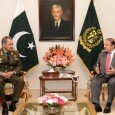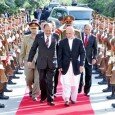By Wajahat Ali –
Even though India is likely to drive the process on its terms, Pakistan stands to reap dividends and soften its isolation
India and Pakistan have decided to relax their visa policies to encourage greater contact among their citizens. This is a significant development since the two countries cannot have a meaningful normalization process without strengthening their peace constituencies and bringing their people onboard.
The question is: how is the current round of engagement likely to unfold? The answer requires us to look at some facts.
India’s foreign policy has rapidly changed since the end of the Cold War. It has abandoned its policy of non-alignment in recent years and developed a close relationship with the United States and Israel. It has also strengthened its economic muscle by reaping the benefits of globalization and is viewed by developed states as an emerging power that can counterbalance China.
Indian policymakers are not narrowly focused on a small cluster of global powers to increase the international clout of their country or advance its economic interests. If anything, New Delhi is dealing with every major power and its leaders have maintained their presence at every significant world forum.
One of the most important components of India’s foreign policy is to be viewed as a responsible state. It may not be on good terms with most of its neighbours and may have lingering disputes with them. However, it maintains a different persona for countries that are not located in this region.
For instance, it has tried to help the ailing European economies by announcing a $10billion contribution to the IMF’s additional $430 billion bailout package. Similarly, it also supported the US economy when U.S. President Barack Obama announced a $10billion trade deal with India.
Obama had maintained that his administration wanted to benefit from India’s burgeoning market and, by turning it into a major export destination, desired to retain about 54,000 jobs in the U.S.
Clearly, India has played its diplomatic hand quite skillfully since the end of the Cold War. It has not only managed to give up its perilous foreign policy posture in the early 1990s but has also effectively plugged itself into the international system that emerged in the wake of the Soviet meltdown.
Now, it harbours the ambition of shaping it up in line with its own strategic interests by playing a more meaningful role on the global stage.
It is important to note that Indian policymakers have carefully examined the global power configuration while formulating their own policies. They have also educated their people about the international architecture and rapidly generated new ideas about how their country fits into it. The result is that Indian strategists regularly debate their country’s strategic interests and help New Delhi’s foreign policy establishment modify its game plan accordingly.
There is hardly any area in the world — any university, media organization and think tank of any significance — where one does not come across an Indian. The fact is that Indian citizens are playing a major role in developing the international narrative on South Asia and the rest of its neighbourhood.
It is therefore, not surprising that the global community has relied on India’s understanding of Pakistan and views most of the problems in this region from New Delhi’s perspective.
Now let’s take a look at Pakistan which has heavily relied on the U.S. to advance its strategic interests in the world. This policy may have worked with varying degree of success during the Cold War. However, it has stopped yielding benefits since the Indians reached out to the Americans.
This is not surprising due to a number of factors. To begin with, Pakistan has never made a significant effort to diversify its foreign policy. It has only been dealing with a handful of states and ignored other global players. Pakistan’s friendship with China has survived mainly because of their troubled relations with India. However, things are also changing on that front since New Delhi and Beijing started trading with each other.
The economic collaboration between the two countries has significantly altered their relationship and the Chinese authorities have become somewhat circumspect while supporting Pakistan on different international forums.
A similar situation can also be seen in the Middle East. Pakistan has used the Arab states to develop its remittance economy. It has also used its religious affinity with these countries to strengthen its diplomatic relations with them.
While Islamabad has immensely benefited from nurturing its ties with the Arab nations, it does not enjoy a unique relationship with them. The number of Indians has rapidly increased in the Gulf states. Many of them have either been doing their own business or working with the corporate sector in significantly high positions.
It does not appear that India’s diplomatic recognition of Israel in the early 1990s has complicated its relations with the Arab world.
Pakistan, on the other hand, has not managed to interest the outside world since it has failed to strengthen itself domestically. It has a transactional relationship with the U.S. and has developed an appalling degree of ambivalence towards that country. It is ironic that India, which was not in the U.S. camp during the Cold War, has managed to forge a more strategic alliance with Washington. This is despite the fact that Pakistan had a massive headstart over New Delhi in this area.
However, the current state of Islamabad’s relationship with Washington is not only reflective of our inabilities on multiple levels but also speaks volumes about India’s skill at international diplomacy.
Pakistan’s foreign policy experts have always reacted to international developments without a clear sense of direction. Many of them have been working on the assumption that the world will not lose its interest in their country due to its immense geopolitical significance.
Ironically, they are not far off the mark: the international community has developed a negative interest in this country and that needs to be changed. While India is acquiring greater global prominence, Pakistan is getting more isolated.
But what do these facts mean for the India-Pakistan normalization process?
It is clear that the new round of engagement will largely unfold on India’s terms and conditions. This means that we are likely to see more people-to-people contact between the two states and the process will be centered on trade, commerce and investment issues. The question of dispute resolution may crop up.
However, the region may not witness any significant breakthrough in that area. Apart from that, India is also likely to put Pakistan under pressure by seeking progress on the Mumbai issue.
However, it may not be a bad scenario for Pakistan as well. If the two sides manage to create mutual dependencies, it will benefit the ailing economy of this country and benefit its people. Depending on its diplomatic acumen, Islamabad may be able to make greater space to discuss contentious issues with New Delhi.
India-Pakistan bonhomie can also undermine the relevance of militant groups and their ideology of hatred. Besides, if the normalization process generates its own momentum, it is likely to bring Pakistan out of isolation and soften the international narrative on it.
It is important to realize in the longer run that Pakistan needs to look at its security strategy as one of the many components of it foreign policy. It also needs to strengthen itself domestically and look beyond India to develop an international vision for itself.
After all, that is the only way it will be able to determine how it wants to engage the world and set the future direction of its foreign policy.
The writer is a journalist with keen interest in foreign policy and based in Islamabad































































































